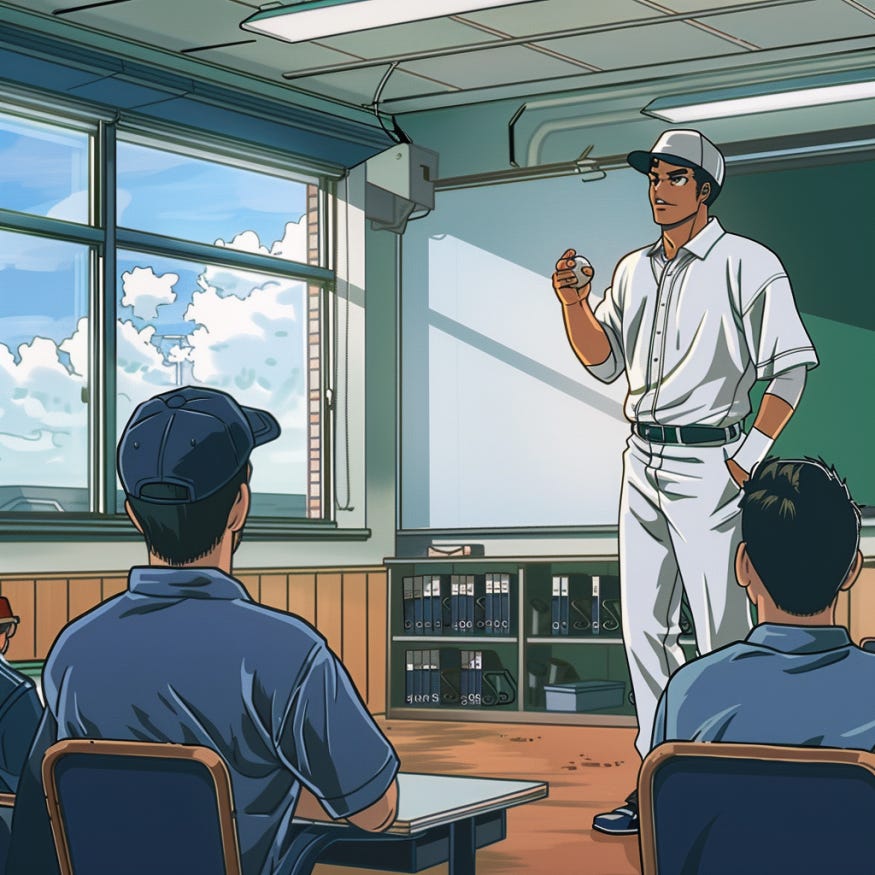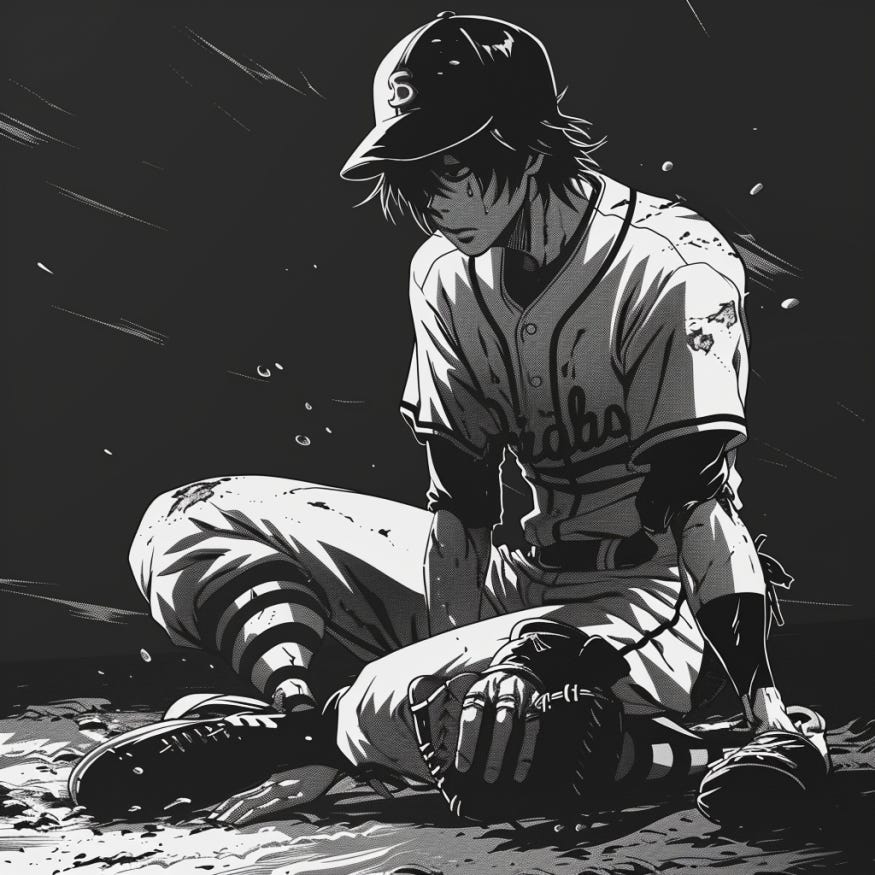What is the meaning of excellence?
As a first-year college student who was also a student-athlete, this question rang in my head daily as I walked around campus. I was a typical naive kid who didn't know what was about to hit him. As the semester went on, we started to practice, and I realized I wasn't good enough to play college baseball. Not yet, at least. I was undersized and less physically developed than my peers. I needed to be bigger and stronger, although I did possess some talent in a few areas, such as making contact with the baseball and catching the baseball, two skills that seem easy but are rather difficult to do at a high level. Still, I was one of the worst performers in the early going, and it seemed like I would not make the team in the spring.
That fall, my baseball coach brought in a mental skills coach.
We sat down with him one evening after practice. When we entered the meeting room, there was a PowerPoint presentation. "The Mental Game of Baseball," read the first slide. As the presentation went on, the man had a lot of different techniques that he taught us, which would help us to "slow the game down," a phrase commonly used in baseball to describe the way players can let their skill and preparation take over under stressors that ordinary people would never be able to perform under. It's how Steph Curry can hit a game-winning three-pointer without thinking twice about it or how Derek Jeter was able to make "the flip play." They weren't thinking about these things; they did them because of hours of focused preparation. Because they had a purpose. Because they were ready. It was a reaction to the moment.
As the meeting wrapped up, the coach addressed the main point of the presentation. "Excellence... to be your best when it means the most, which is every single day," he said, elaborating on what it meant to be excellent. He wanted us to try our best daily, not make excuses, and be fully committed to the present moment.
This mantra quickly resonated with me. It was as if I had found some missing piece to a puzzle I had been working on for months. It was then that I realized that working hard is not excellence. Most people work hard, but only some get the desired results. Excellence is about doing things with a purpose and consistently doing them to create the journey you wish for. It's something that I thought I was doing my whole life, but it was clear that I lacked the purpose and the awareness required to truly be excellent.
Over the next few days, I pondered over my early baseball career; I did enough to be good but not to be great. I woke up early, worked out, practiced, and did well in school—everything you need to play college baseball. The fact is that while those things got me to where I thought I wanted to be, I was doing what everyone else did. My mind wasn't entirely into it, and neither was my soul. I remembered when I would have a bad game, and my mind would fail me, turning one bad game into two, then into five, and so on.
I did well at practice and school but needed a true plan. I was just there to get better, with no direction or purpose. I would also zone out often, relying on my God-given ability and "work ethic" to be good enough.
As a person, I was much the same. I did everything I thought a good person did: I was polite, treated people with respect, and said yes sir/no sir when spoken to by adults. Again, I was checking boxes. I wasn't genuinely intentional about being a good person. When push came to shove, I was rather lousy. I lied, I talked back, and I was disrespectful when things didn't go my way.
So, as I sat in my dorm room pondering this "excellence" deal, I decided to try it.
Two factors allowed me to make the switch:
I finally had a clear guide on what I was missing. The mental skills coach gave us a clear plan to execute excellence. It was living in the present moment and having a clear intention for everything you do. Let's call this having the correct information.
Second, I had nothing to lose; I could either make a change or keep living this mediocre life. It's funny how humans can make radical changes when they're pushed into a corner if they have the correct information.
I adopted this mantra on the baseball field. At first, it pushed me to turn it up a notch. My shift was mainly one of awareness and present-moment focus. Before, I would sleepwalk through workouts, practices, and games. I was checking boxes, albeit subconsciously. Now, I was able to find a balance between purpose-driven work and an easygoing attitude, let’s call this a relaxed concentration.
As a person, I was more present and intentional about my interactions with people, giving them my best self, not a half-ass version. I also cleaned up who I surrounded myself with. I learned that your environment determines who you will become, something I'm very aware of today.
My process changed that winter. I was laser-focused on my goals; fixated on them My mission was clear; I wanted to play in the major leagues. I tailored my full day around this mission, from my meals to my workouts to everything around it. Nothing was going to stop me. The first hurdle was to make the team in the spring, which required me to get much stronger and mentally tough. And so, every day that winter, I worked with a purpose and a clear path to what I wanted to do.
Then came the spring.
I showed up to campus 10 pounds heavier with what felt like 100 pounds less mental baggage. I had leveled up mentally and physically, leading to extraordinary on-field results. I had such great success with my new self that I became one of the best players on the team. At practice, every rep was meaningful. In games, I focused on each pitch. I wasn't worried about the next pitch or the previous pitch. It was like a cheat code. Everything slowed down for me. As the years went on, I cemented myself as one of the better players in school history and one of the best in the conference. I was doing everything I could to achieve my mission.
You can do anything if it's what you want. If you don't reach your goal, it isn't what you truly wanted.
My senior year, my mission was different from what I truly wanted. Not because I didn't want to play in the major leagues; after all, it was my one genuine desire. Quite the opposite; I wanted it so bad that I was trying to force it to happen. What I truly wanted instead was not to fail. Excellence took over my life. I recall my days being so structured that I had to be robot-like and work on my craft at all times. No fun, no process, all work; failure was not allowed. I would wake up with baseball and go to sleep with baseball. I became my baseball outcomes. One thing I learned about the game is that it will humble you, and you will fail very often. The failure began to weigh on me heavier than ever before. I was doing everything right and being "excellent," so how was I failing more now? The relaxed concentration I had in my first three years faded away. Once again, my process became a checklist I had to satisfy, although at a higher level than before. The game that had once slowed down became fast again.
My body and my mind broke down that year. I had my worst year as a college baseball player at a time when I was supposed to be my best. I began to let my past performances affect my future ones, just like I did in high school. I became a selfish player and person because I was so laser-focused on my goals. I also started suffering injuries, concluding with a season-ending ACL tear halfway through the year, which essentially ended my baseball dream.
You know when you try so hard that you don't get what you want? Maybe you're chasing after a girl or a perfect test score in school. When you try too hard, it's tough to succeed because you tend to focus on not failing. In my senior year, I focused on not failing and did not succeed.
I figured out another part of excellence after my senior year: adaptability. We have to adapt to new situations, which requires a very high level of self-awareness.
Adaptability is what makes it hard to sustain excellence. Life and circumstances change, meaning the path to what we want changes. It becomes a different path. If we do not recognize this, we will most certainly fail. It's why many old businesses fail; they don’t adapt to new circumstances. They continue to do the same thing over and over. Once the game changes, it's game over.
As I've grown and experienced more of life, not just as a baseball player but now as a business person, a boyfriend, a son, and a brother, among other things, I've learned that the meaning of excellence varies from day to day. It doesn't mean you have to be perfect. It doesn't mean you're the best or will be the best. It means something different at each step of your life.
When I played baseball, it meant showing up to the field early, leaving late, and being focused on each pitch. These days, it means spending quality time and being present with my partner. On other days, it means focused work for 8 hours straight.
Excellence means doing what I'm supposed to do when I'm supposed to do it and being fully present in it.
We know what we're supposed to do at any given time. We know when to work when to relax, and when to give effort. We know when to push ourselves even if we don't like it.
Excellence is being aware of the moment and doing your best with it. It's being true to yourself and living up to your potential. Excellence is ever-changing; it is living life how it should be. Excellence is finding purpose in your work, taking responsibility for your life's path, and, most importantly, giving yourself the freedom to fulfill your mission in this world.






